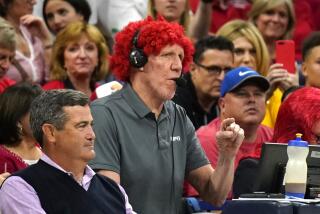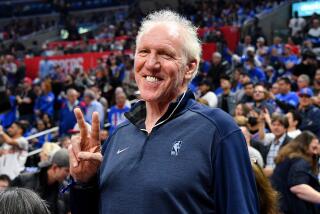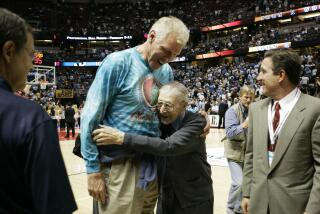When Wizard Reached Point of No Return
This being the morning after the night the Final Four became the Big One, the sporting world is busy saluting a new college coaching genius. His name, this year, is Denny Crum.
This is the way it should be. A guy’s got to be a genius to put together a team, keep the players from jumping school or flunking class, dodge the NCAA snoops, keep the philanthropic alumni in check and survive the 500-team NCAA tournament draw, or whatever number it’s up to these days.
But while we’re at it, conferring honorary titles on the winning coach, this would be a good time to give a quick nod to the one man who long ago was promoted from the rank of genius to wizard.
After all, if it hadn’t been for John Wooden, the Final Four might still be a nice little sporting event with the charm of a county fair, not the colossal spectacle and media extravaganza it has become.
Fans love a dynasty. The Yankees, the Packers, the Celtics, Arnie Palmer. And Wooden gave the fans a dynasty that made J.R. Ewing’s look like a shoe-shine stand.
In 1975, Wooden walked away from it all. Walking off the court after his Bruins had beaten Crum’s Louisville team in overtime in the national semifinals, Wooden decided to quit. He walked into the locker room and told his players that the championship game against Kentucky would be his last.
“We were all ecstatic about the overtime win,” recalled Marques Johnson, who was a sophomore on that team and who now plays for the Clippers. “He kind of dropped the bomb on us. Everyone was saddened and shocked.
“I was disappointed, but I understood. I had breakfast with him the morning after we beat Kentucky. He told Richard Washington and me that he was tired of the high level of expectations, the monster he had created.”
The monster’s vital statistics were 10, 7 and 88. That’s 10 NCAA titles, 7 of them in a row, and an 88-game winning streak along the way.
“I can remember going to UCLA and thinking I was going to win four national championships, that it would be automatic,” Johnson said. “We lost in the finals my freshman year and I thought, ‘Well, at least I’ll get three.
“It didn’t dawn on me until my senior year the enormity of what he had accomplished, and how it wasn’t as easy to win as he’d made it seem.”
Wooden did make it look easy. He didn’t believe in weightlifting, fighting, scouting, screaming, stalling, dogging, hotdogging or sending a team into action with its shoes improperly laced.
Each new season, Wooden’s first practice session with his team would be devoted to instruction on the proper way to put on socks, with any wrinkles smoothed out to prevent blisters, and to tie shoes, over the top of the eyehole for a tighter lace.
At practices and in games, no UCLA player was allowed to let his jersey come untucked from his shorts, or to let his socks sag around his ankles.
“But it’s funny,” Johnson said. “We didn’t have a dress code on the road. We had Bill Walton and Greg Lee, who liked jeans and casual clothes, so we’d look like bums coming to the game. But we’d all look neat while we were playing.”
Wooden never scouted an opponent and never prepared his team to meet a specific team or individual. He didn’t use the word win. He was a coach, not a scorekeeper. His job was to condition, teach and motivate.
His players would develop a quiet sense of superiority that opponents found intimidating and sometimes galling.
His players played their own individual styles but in Wooden’s system. If a teammate fed you for a basket, you always acknowledged the teammate, immediately.
“But what if he doesn’t see me acknowledge him?” a player asked Wooden.
“I’ll see you,” Wooden said.
Corny? He was and still is. Each season, not long after the shoelace seminar, the Bruins were given an extended lecture on Coach Wooden’s pyramid of success, which looks like something out of a 1920s Boy Scout handbook.
Wooden is so corny that he got choked up when, after the Bruins had won the NCAA title in 1970, then-President Richard Nixon phoned to offer congratulations.
He would tell his players before a game that the final score didn’t matter, only whether or not they gave 100% effort. Did the players buy that cornball line?
“I loved it,” Johnson said. “I was 17, 18 years old. The older players, after they had heard it for a while . . . You know, I think they bought it, too, yeah.”
Wooden was a wizard but never a god. He never reached the deity status of guys like Adolph Rupp or Dean Smith or even Bob Knight. That wasn’t his style and it wasn’t the city’s style.
Basketball was a game here, not a religion. Gods you worship. Wizards? You just sit back and enjoy their wizardry.
Wooden wasn’t a showman; still isn’t. He didn’t wear funny clothes or wave funny props--OK, he did carry a rolled-up program--or throw chairs or tantrums.
“I wanted people to come and see my team play,” he has said. “I wanted my team to provide the entertainment.”
And his team did, for 27 blister-free seasons.
More to Read
Go beyond the scoreboard
Get the latest on L.A.'s teams in the daily Sports Report newsletter.
You may occasionally receive promotional content from the Los Angeles Times.










